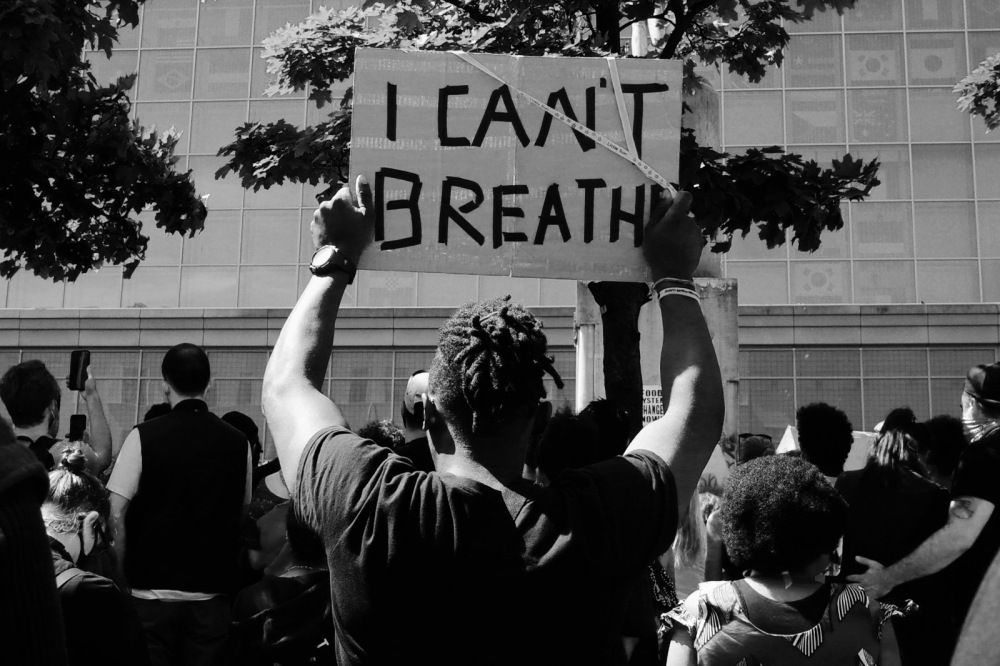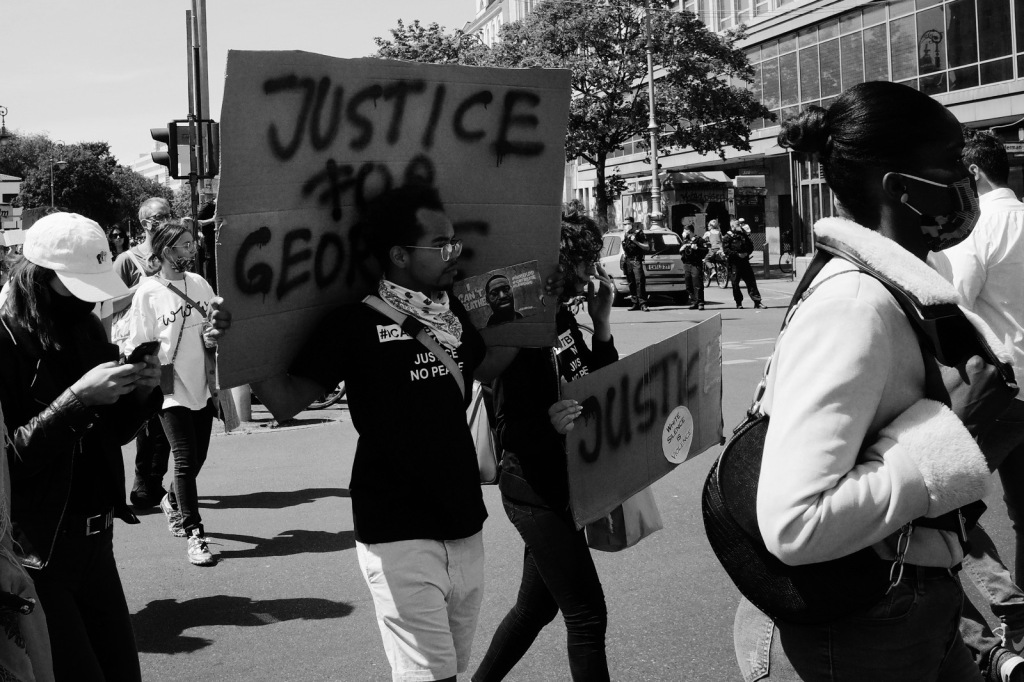
Image courtesy of Johara Meyer
Hannah Lising- White comments that the police murder of George Floyd and anti-racism protests in America should be indicative of a shift toward stronger anti-racism politics and the necessary recognition of institutional racism. She also outlines ways that non-black people can support the Black Lives Matter movement.
The tragic loss of George Floyd on Monday 25th May has sparked the largest public global response to institutional racism and collaborative fight for justice seen since the 1960s. This murder happened in the same week as the police shooting of a black transgender man, Tony McDade, and shortly after the police shooting of Breonna Taylor on the 13th March.
Mr. Floyd was being arrested for allegedly using a counterfeit $20 note, and despite being unarmed and audibly struggling for breath, he was pinned to the floor and killed by former police officer Derek Chauvin.
Tonight marks the fifth night of violent protests in cities across the US, in response to the continuing over-policing of black bodies and protection of racist white police officers – one of many features of institutional racism. Descriptions of protests being called ‘chaotic’ are misleading and problematic. They are not random or chaotic in any sense of those words, the protests are constructed by the oppressive circumstances and direct consequences of persistent racism. The word ‘chaos’ insinuates unjustified violence when in fact, these are anti-racism demonstrations. Activists have harnessed the power of social media to express frustrations with the oppressive racism embedded in American society. On social media, @revolttv @untilfreedom quoted @tamikadmallory saying ‘America has looted black people. We learned it from you. We learned violence from you. If you want us to do better, then dammit’, you do better’.
Whilst racist police brutality in the US is more apparent than in the UK, partly due to the prevalence of firearms, it still exists globally and structural racism is prevalent and oppressive in Britain.
In 2019 Cressida Dick, Commissioner of London’s Metropolitan Police, stated that Britain’s police force are no longer ‘institutionally racist’. On the contrary, data shows that between April 2018-March 2019 in the UK, black people are almost ten times more likely to be stopped and searched than any other white background. Racial bias is also perceptible in the impacts of COVID-19: black people are four times more likely to die from the virus than white people. Race equality think tank The Runnymede Trust presents substantial evidence that harsher socioeconomic circumstances experienced by Britain’s ethnic minorities disproportionately predispose them to ill-health such as precarious work, poor housing conditions and insufficient nutrition.
We have to overcome denial. We have to overcome wanting to defend our own positions; it is costing lives. We need to reach the point where we ask what we can do to overcome institutional racism instead of simply saying it no longer exists. Ijeoma Oluo, author of So You Want To Talk About Race said, ‘the beauty of anti-racism is that you don’t have to pretend to be free of racism to be an anti-racist. Anti-racism is the commitment to fighting racism wherever you find it, including in yourself. And that is the only way forward.’
Dismantling racism starts with facing and addressing the structures that normalise it. Targeting racism and white privilege is not about blame and guilt. If you feel these then harness them for the cause of anti-racism. If you feel guilty about speaking up, understand why. What are you protecting? Who are you scared of offending? Why are you more scared of that than the loss of black lives? Anti-racism is an intersectional endeavour. In the UK we need to address why we feel accountable to particular structures, and work towards refocusing on being accountable to oppression, not to power and privilege.
A social media thread initiated by Florence Given (@florencegiven), a British feminist and queer activist, connects patriarchal norms to obstructing anti-racism because the internalised fear of being outspoken and being cast as divisive, ‘too political’ and undesirable holds women back from expressing grievances and resisting subordination. As long as the fear of being viewed as an ‘angry feminist’ amongst peers is more powerful than the moral imperative to fight racism, the anti-racist movement will be underpowered.

George Floyd’s murder has initiated the sharing of learning resources about racism and how we can move forward to improve our societies. This is an important and constructive effort that the British government needs to actively engage in too. There needs to be a paradigmatic shift in the nature and priorities of the criminal justice system, a concerted effort to educate and instil a sense of public service in law enforcement and better education on the persistent legacies of racism, including the history of colonisation (particularly British).
Racism is socially constructed and exists because of actions and words that reinforce white privilege. ‘The new racism is to deny that racism exists’, claims @wetheurban, an Instagram account dedicated to amplifying marginalised voices. It is our responsibility to hold ourselves and governments accountable, to re-educate ourselves and have the uncomfortable but essential conversations to overcome racism. Renni Eddo-Lodge in her book, Why I’m No Longer Talking to White People About Race, draws attention to the lack of education on black British history and the misinformed assumption that all black and brown people in the UK are recent immigrants. She highlights that many people from Africa, the Caribbean and Asia who came to settle in Britain, fought for the British Army in the First World War after being promised that their countries would be free from colonial rule for doing so.
Starting university and through my undergraduate studies within Human Geography, I became much more aware of structural social inequalities such as racism. Although my mum’s side of the family is from Mauritius, we are of Asian heritage and I am the first generation to be born in the UK. I therefore do not speak from a position of being African American or from an experience of blackness. My father is white and so I feel like despite my aesthetic ethnic ambiguity I am ‘white enough’ to assume white, or non-black privilege and so it has been imperative to understand and self-educate on how these oppressive social structures are produced and reproduced. I am still learning and this opinion piece does not intend to speak from any position of authority.
Where to go from here?
Based on these recent events, it is normal to be feeling a wave of emotions. This may be inclusive of sympathy, sadness, guilt, fear, shame and exhaustion. All of these feelings are valid, and here are some instant resources to educate yourself on the history of oppression against black people what can be done to be anti-racist. As well as this, it is vital to look at the long-term changes that we can all make to ensure equality is reached. This includes voting out racist politicians who implement racist policies, support the leadership of people of colour and listen to those who are directly impacted. It is also important to reach out to your black friends who may be affected, let them know that you care about this issue and ask them what you can do to help the cause.
Petitions to sign:
- Raise the degree- change.org
- Justice for George Floyd- change.org
- Demand justice for George Floyd- amnesty.org
- Get the officers charged- change.org
- National action against police brutality- change.org
Donations:
- National bail fund network- communityjusticeexhange.org
- BLM frontline fund- gofundme.com
- George Floyd memorial fund- gofundme.com
- Belly Mujinga fund- gofundme.com
- In memory of Tony Mcdade- gofundme.com
Further readings:
- Are prisons obsolete? – Angela Davis (2003)
- Between the worlds and me- TaNehisi Coates (2015)
- If Beale Street could talk- James Baldwin (1974)
- How to be an anti-racist- Ibram X Kendi (2019)
- The New Jim Crow- Michelle Alexander (2010)
- Why I’m no longer talking to white people about race – Reni Eddo-Lodge (2017)
- Racism and police brutality in America- Cassandra Chaney and Ray V. Robertson (2013)
Film, documentaries and podcasts:
- I am not your Negro (2016)- dir. Raoul Peck
- When they see us (2019)- dir. Ava Duvernay
- Let the fire burn (2013)- dir.Jason Osder
- The Black Panthers: vanguard of the revolution (2015)- dir. Stanley Nelson
- 13th (2016) – dir. Ava Duvernay
- Toni Morrison’s Nobel Prize lecture (1993)
- Selma (2014)- dir. Ava Duvernay
- If Beale Street could talk (2018)- dir. Barry Jenkins
- Would you switch places with a black person? – podcast, Kelechi Okafor (2020)
- Becoming an ally- @thecut (2020)
This article is in no way a comprehensive account of racism, anti-racism or white privilege. We hope that this is an introduction to an ongoing series. We appreciate any and all feedback as we analyse and discuss these matters in the coming weeks and months.
We would like to make a concerted effort to add that whilst checking in with black friends, family and colleagues and saying that we are here to support, these sentiments should not express white guilt – this is not productive and is emotionally burdensome to the person you’re telling. The sentiments should not be asking for help either. It is not their responsibility to teach white people about racism and white privilege. – Hannah Lising-White
LikeLiked by 2 people